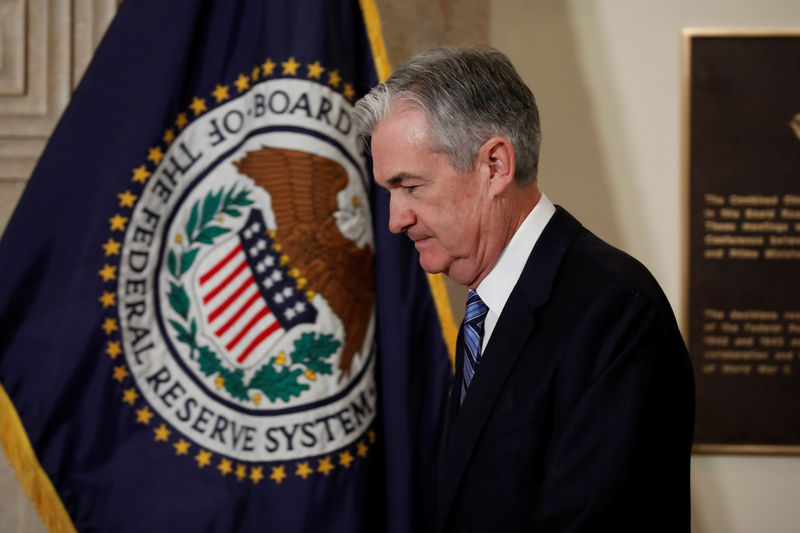 © Reuters. Federal Reserve Chairman Jerome Powell arrives to take the oath of office at the Federal Reserve in Washington
© Reuters. Federal Reserve Chairman Jerome Powell arrives to take the oath of office at the Federal Reserve in WashingtonBy Howard Schneider
WASHINGTON (Reuters) – Freed from economic crisis and aligned with the party in power, new Federal Reserve Chairman Jerome Powell makes his first appearance before Congress on Tuesday in what is widely expected to mark a reset of sorts in relations between the central bank and elected lawmakers.
After a decade of arguably strained ties, dating to the Fed’s politically controversial crisis-era programs and including former chair Janet Yellen’s sometimes rocky appearances on Capitol Hill, Fed officials and observers say the bank under Powell may be able to set aside concerns, for example, that a Republican majority will tighten oversight of the Fed.
That, in turn, could leave breathing room for longer-term debates about how the Fed operates, and whether it should make nearer-term changes in its procedures, such as by holding press conferences after each of its eight annual policy meetings instead of just quarterly.
Several policymakers have argued the Fed is due for a broad rethink, for example, of its approach to inflation.
“I am very much looking forward to that,” St. Louis Fed President James Bullard said of the prospect that relations between the Fed and Congress may improve under Powell, a moderate Republican with longstanding ties in Washington.
“When it is not raining it is a good time to fix the roof.”
Powell’s appearance will be his first public outing since taking over from Yellen, allowing him to set a baseline for how he views the economy, recent market volatility, and the impact of the Trump administration’s fiscal policy changes.
The recent stock market selloff and an uptick in inflation concerns mean Powell’s first months in office may be consumed by debate on whether the Fed should lean against inflation with faster rate increases – and risk the ire of a White House aiming to boost growth – or stick to the gradual rate path championed by Yellen.
As yet, economic data has not been so robust as to suggest Fed officials will go beyond the three rate hikes they have indicated are likely this year, and indeed some have said higher inflation would be a good thing after years of below-target performance.
HONEYMOON IN CONGRESS
While the benign economic environment helps, analysts and experts on Fed-Congress relations say that what may be more significant is whether a Republican-led Congress gives a Republican administration’s new Fed chair a honeymoon of sorts, free of the threat of stricter congressional oversight that dogged Yellen’s years.
Democrats may now become the aggressors, critical of the former investment banker’s ties to the financial industry and worried he may want to roll back regulations.
But overall “there are a number of things going for Powell that are going to reduce the temperature,” said Sarah Binder, a George Washington University political scientist and author of a recent book on congressional relations with the Fed.
Binder’s co-author Mark Spindel, founder of Washington-based investment firm Potomac River Capital, said the partisan flip from Yellen to Powell was “absolutely crucial.”
“He benefits because he is not Yellen,” Spindel said. And given the state of the economy, he has a luxury that Yellen did not and her predecessor Ben Bernanke “surely did not at all.”
Though Bernanke was appointed by a Republican president, he was reappointed by Democrat Barack Obama and faced a difficult second confirmation because of controversy over the crisis-fighting bondbuying and bailouts he approved.
Yellen over four years waged a steady fight against Republican proposals to assert stricter oversight of monetary policy, and was often discouraged by Republican leaders against considering certain reforms such as a higher inflation target or negative interest rates.
She also was criticized for not moving faster to shed Fed asset holdings accumulated during the crisis, and over narrower issues such as congressional demands for documents on legal matters.
To Powell’s advantage, many of those issues were cleared from the table before he took over. In addition, for now at least, the Fed’s tempered approach to raising rates is in line with what would give the new Republican tax plan the best chance for the benefits Republicans contend are in store.
A calmer mood between the Fed and Congress would also be “constructive” for markets, said Karim Basta, chief economist at Boca Raton, Florida-based III Capital Management.
Source: Investing.com




























